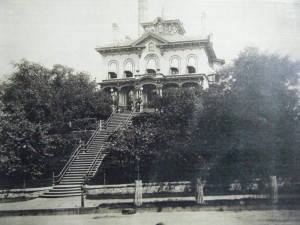How Did This Milwaukee House Change Property Law?
 Come to the Boden Lecture and find out. Indeed, I encourage the Law School and the broader legal community to turn out in force for the lecture this coming Thursday, Sept. 23, at 4:30 p.m. in the Appellate Courtroom of Eckstein Hall. It will be delivered by Thomas W. Merrill, an especially distinguished legal academic (he is the Charles Evans Hughes Professor at Columbia Law School) and an outstanding lawyer (he has argued more than a dozen cases in the U.S. Supreme Court). The nature of Prof. Merrill’s topic should make the talk of interest to the broader community as well: it will provide a take on how Milwaukee’s industrial past has affected American property law. In particular, Prof. Merrill will discuss his original historical research concerning a well-known case from the late nineteenth century, which appears in first-year property textbooks: Melms v. Pabst Brewing Co. The Wisconsin Supreme Court’s decision in Melms concerned the fate of part of the Philip Best Brewery site on the near-south side of Milwaukee (to which Captain Frederick Pabst had succeeded): parts of the plant still remain just west of 6th Street, along Virginia, barely more than a mile from the Law School, in what eventually became the Pfister & Vogel property. So there is a substantial local-history angle to the lecture as well. Let’s make the first Boden Lecture in Eckstein Hall a resounding success by supporting it; I know that Prof. Merrill will do his part by delivering an outstanding lecture. You can register here.
Come to the Boden Lecture and find out. Indeed, I encourage the Law School and the broader legal community to turn out in force for the lecture this coming Thursday, Sept. 23, at 4:30 p.m. in the Appellate Courtroom of Eckstein Hall. It will be delivered by Thomas W. Merrill, an especially distinguished legal academic (he is the Charles Evans Hughes Professor at Columbia Law School) and an outstanding lawyer (he has argued more than a dozen cases in the U.S. Supreme Court). The nature of Prof. Merrill’s topic should make the talk of interest to the broader community as well: it will provide a take on how Milwaukee’s industrial past has affected American property law. In particular, Prof. Merrill will discuss his original historical research concerning a well-known case from the late nineteenth century, which appears in first-year property textbooks: Melms v. Pabst Brewing Co. The Wisconsin Supreme Court’s decision in Melms concerned the fate of part of the Philip Best Brewery site on the near-south side of Milwaukee (to which Captain Frederick Pabst had succeeded): parts of the plant still remain just west of 6th Street, along Virginia, barely more than a mile from the Law School, in what eventually became the Pfister & Vogel property. So there is a substantial local-history angle to the lecture as well. Let’s make the first Boden Lecture in Eckstein Hall a resounding success by supporting it; I know that Prof. Merrill will do his part by delivering an outstanding lecture. You can register here.

